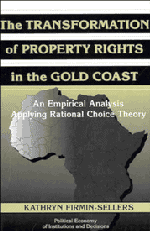 The Transformation of Property Rights in the Gold Coast
The Transformation of Property Rights in the Gold Coast Published online by Cambridge University Press: 08 January 2010
In chapter 3, I examined a state in which the distributional conflict over property rights institutions was never resolved, leaving both property rights and tradition fluid and poorly enforced. In this chapter, I examine a state in which an alternative outcome was obtained. In Akyem Abuakwa, the distributional conflict over land was resolved; property rights and tradition were fixed and well defined. What accounts for these divergent results?
My analysis of the Akyem case underscores many of the conclusions reached in prior chapters. The indigenous elites responded to the commercialization of land by ‘reinventing tradition. ’ They articulated a notion of customary land tenure that allowed them to profit from the new economic opportunities. Predictably, their declaration of tradition sparked intense conflict within the state over the distribution of land. The institutional structure of indirect rule forced elites to turn to British colonial authorities to resolve that conflict. The ties between local elites and the colonial state were therefore crucial to the enforcement of property rights.
Equally important, the analysis of the Akyem case yields new insight into the study of property rights institutions. In this chapter, I argue that property rights institutions cannot be founded on the basis of coercive authority alone. Coercion is a necessary but not sufficient condition for the creation of a stable property rights system. Property rights will be secure only when citizens have some assurance that the coercive agent will not abuse her authority and confiscate others' wealth, and when the defeated actors are given a positive incentive to invest on the basis of the new property rights system.
To save this book to your Kindle, first ensure [email protected] is added to your Approved Personal Document E-mail List under your Personal Document Settings on the Manage Your Content and Devices page of your Amazon account. Then enter the ‘name’ part of your Kindle email address below. Find out more about saving to your Kindle.
Note you can select to save to either the @free.kindle.com or @kindle.com variations. ‘@free.kindle.com’ emails are free but can only be saved to your device when it is connected to wi-fi. ‘@kindle.com’ emails can be delivered even when you are not connected to wi-fi, but note that service fees apply.
Find out more about the Kindle Personal Document Service.
To save content items to your account, please confirm that you agree to abide by our usage policies. If this is the first time you use this feature, you will be asked to authorise Cambridge Core to connect with your account. Find out more about saving content to Dropbox.
To save content items to your account, please confirm that you agree to abide by our usage policies. If this is the first time you use this feature, you will be asked to authorise Cambridge Core to connect with your account. Find out more about saving content to Google Drive.